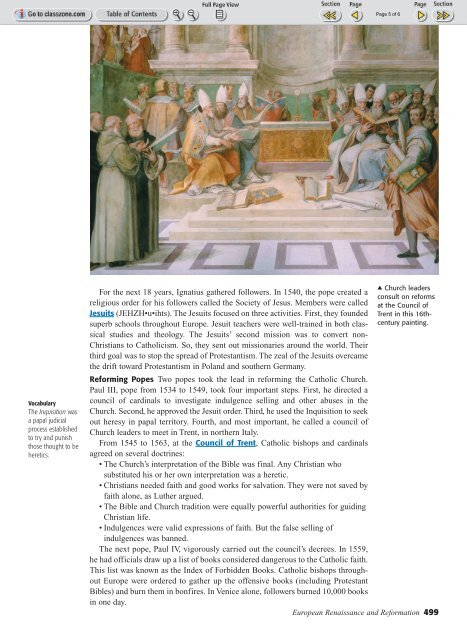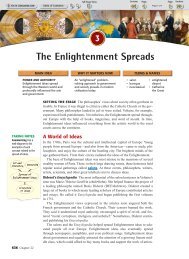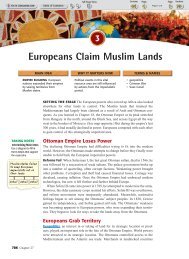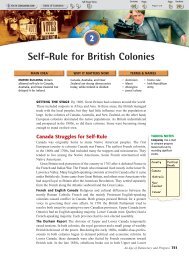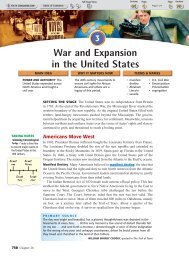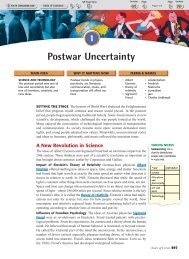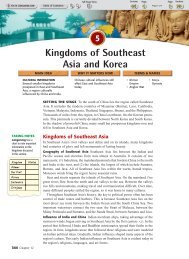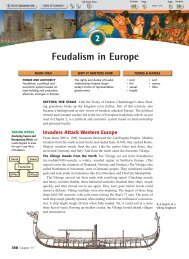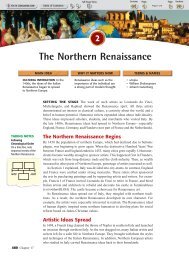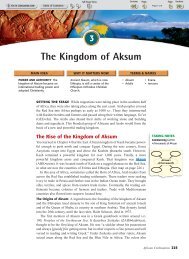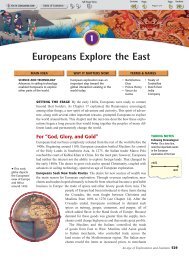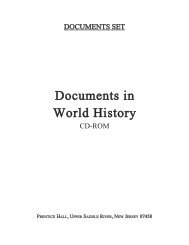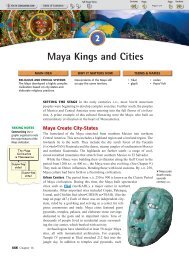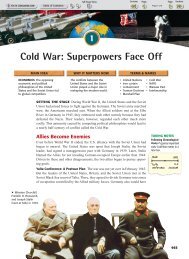Francis I, Marguerite of Navarre, protected John Calvin frombeing executed for his beliefs while he lived in France. Othernoblewomen also protected reformers. <strong>The</strong> wives of somereformers, too, had influence. Katherina Zell, married toMatthew Zell of Strasbourg, once scolded a minister for speakingharshly of another reformer. <strong>The</strong> minister responded by sayingthat she had “disturbed the peace.” She answered hiscriticism sharply:▲ Although Catholic,Marguerite ofNavarre supportedthe call for reformin the Church.PRIMARY SOURCEDo you call this disturbing the peace that instead of spending mytime in frivolous amusements I have visited the plague-infestedand carried out the dead? I have visited those in prison and undersentence of death. Often for three days and three nights I haveneither eaten nor slept. I have never mounted the pulpit, but Ihave done more than any minister in visiting those in misery.KATHERINA ZELL, quoted in Women of the <strong>Reformation</strong>Katherina von Bora played a more typical, behind-the-scenes role as Luther’s wife.Katherina was sent to a convent at about age ten, and had be<strong>com</strong>e a nun. Inspired byLuther’s teaching, she fled the convent. After marrying Luther, Katherina had six children.She also managed the family finances, fed all who visited their house, and supportedher husband’s work. She respected Luther’s position but argued with him aboutwoman’s equal role in marriage.As Protestant religions became more firmly established, their organizationbecame more formal. Male religious leaders narrowly limited women’s activities tothe home and discouraged them from being leaders in the church. In fact, it wasLuther who said, “God’s highest gift on earth is a pious, cheerful, God-fearing,home-keeping wife.”<strong>The</strong> Catholic <strong>Reformation</strong>While Protestant churches won many followers, millions remained true toCatholicism. Helping Catholics to remain loyal was a movement within theCatholic Church to reform itself. This movement is now known as the Catholic<strong>Reformation</strong>. Historians once referred to it as the Counter <strong>Reformation</strong>. Importantleaders in this movement were reformers, such as Ignatius (ihg•NAY•shuhs) ofLoyola, who founded new religious orders, and two popes—Paul III and Paul IV—who took actions to reform and renew the Church from within.Ignatius of Loyola Ignatius grew up in his father’s castle in Loyola, Spain. <strong>The</strong>great turning point in his life came in 1521 when he was injured in a war. Whilerecovering, he thought about his past sins and about the life of Jesus. His dailydevotions, he believed, cleansed his soul. In 1522, Ignatius began writing a bookcalled Spiritual Exercises that laid out a day-by-day plan of meditation, prayer, andstudy. In it, he <strong>com</strong>pared spiritual and physical exercise:MakingInferencesWhy was iteasier for womento take part in theearlier stages of the<strong>Reformation</strong> than inthe later stages?PRIMARY SOURCEJust as walking, traveling, and running are bodily exercises, preparing the soul toremove ill-ordered affections, and after their removal seeking and finding the will ofGod with respect to the ordering of one’s own life and the salvation of one’s soul, areSpiritual Exercises.IGNATIUS OF LOYOLA, Spiritual Exercises498 Chapter 17
Vocabulary<strong>The</strong> Inquisition wasa papal judicialprocess establishedto try and punishthose thought to beheretics.For the next 18 years, Ignatius gathered followers. In 1540, the pope created areligious order for his followers called the Society of Jesus. Members were calledJesuits (JEHZH•u•ihts). <strong>The</strong> Jesuits focused on three activities. First, they foundedsuperb schools throughout <strong>Euro</strong>pe. Jesuit teachers were well-trained in both classicalstudies and theology. <strong>The</strong> Jesuits’ second mission was to convert non-Christians to Catholicism. So, they sent out missionaries around the world. <strong>The</strong>irthird goal was to stop the spread of Protestantism. <strong>The</strong> zeal of the Jesuits overcamethe drift toward Protestantism in Poland and southern Germany.▲ Church leadersconsult on reformsat the Council ofTrent in this 16thcenturypainting.Reforming Popes Two popes took the lead in reforming the Catholic Church.Paul III, pope from 1534 to 1549, took four important steps. First, he directed acouncil of cardinals to investigate indulgence selling and other abuses in theChurch. Second, he approved the Jesuit order. Third, he used the Inquisition to seekout heresy in papal territory. Fourth, and most important, he called a council ofChurch leaders to meet in Trent, in northern Italy.From 1545 to 1563, at the Council of Trent, Catholic bishops and cardinalsagreed on several doctrines:• <strong>The</strong> Church’s interpretation of the Bible was final. Any Christian whosubstituted his or her own interpretation was a heretic.• Christians needed faith and good works for salvation. <strong>The</strong>y were not saved byfaith alone, as Luther argued.• <strong>The</strong> Bible and Church tradition were equally powerful authorities for guidingChristian life.• Indulgences were valid expressions of faith. But the false selling ofindulgences was banned.<strong>The</strong> next pope, Paul IV, vigorously carried out the council’s decrees. In 1559,he had officials draw up a list of books considered dangerous to the Catholic faith.This list was known as the Index of Forbidden Books. Catholic bishops throughout<strong>Euro</strong>pe were ordered to gather up the offensive books (including ProtestantBibles) and burn them in bonfires. In Venice alone, followers burned 10,000 booksin one day.<strong>Euro</strong>pean Renaissance and <strong>Reformation</strong> 499


